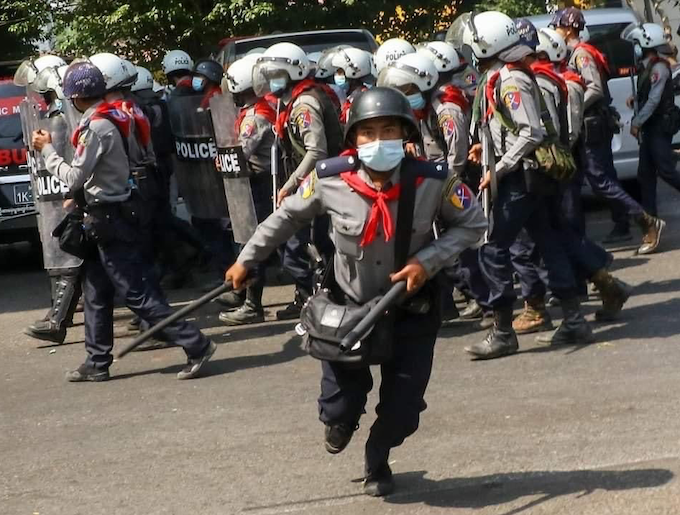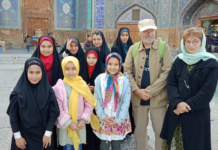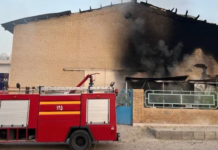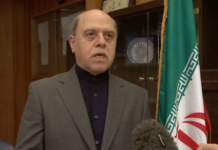
Reporters Without Borders (RSF) is dismayed by the sudden intensification of the ruling junta’s crackdown on journalists during the past three days, one month after the military coup in Myanmar on February 1, and warns the junta of its responsibility in the eyes of history.
In all, at least 28 journalists have been arrested in the course of the past month of pro-democracy street protests, against which – after hesitating for weeks – the junta suddenly began making much wider use of deadly force last weekend.
But, whereas reporters covering past protests were quickly released after being arrested, things have changed radically in the past few days, and at least 11 journalists were in detention, said the RSF statement.
- READ MORE: Myanmar’s Bloody Sunday – security forces ‘live tracking’ media, protesters
- More killed as Myanmar forces open fire against anti-coup protesters
The latest to be arrested was Kaung Myat Naing (aka Aung Kyaw) of the Democratic Voice of Burma news agency, who livestreamed police coming to arrest him at his home in the far south city of Myeik at around 10:30 pm on Tuesday.
You can hear him ask the police if they have a warrant, to which they respond with shouts and gunfire.
“We call on Myanmar’s government to order the immediate and unconditional release of all the journalists currently detained, and to drop the charges against them,” said Daniel Bastard, the head of RSF’s Asia-Pacific desk.
“It is absolutely crucial that reporters should be able to cover this dramatic moment in Myanmar’s history. The generals who took power must realise that the world is looking at them and that history will judge them.”
Badly beaten
The 11 journalists currently detained include Chinland Post reporter Salai David, who was arrested on Tuesday morning in Hakha, the capital of the western state of Chin.
Monywa Gazette reporter Lay Min Soe was arrested yesterday in Monywa, in the central region of Sagaing, but was released later in the day after sustaining injuries in the beating he received from the police.
A Chinese reporter for the Xinhua news agency was meanwhile hit by rubber bullets while covering a protest in Yangon, Myanmar’s largest city, in the south of the country.
Six journalists were arrested in various parts of the country on February 28.
YamaNya Taing reporter Lin Tun was released the next day after being arrested in the southern city of Mawlamyine. 74 Media website reporter Paung Lan Taung was released later the same day after being arrested in the northern city of Myitkyina.
Ye Yint Tun, a journalist with the Than Taw Sint newspaper, was jailed after being arrested in the southwestern city of Pathein.
Chun Journal editor Kyaw Nay Min was taken to Inn Sein prison after being arrested in Yangon. Freelance reporter Soe Yarzar Tun suffered the same fate.
The sixth journalist to be arrested on February 28 was Shin Moe Myint, a Yangon-based psychology student who was covering the protests as a freelancer. Two witnesses told RSF she was badly beaten before being bundled into a police van and taken in the direction of Inn Sein prison.
She was finally released on Tuesday.
Multiple arrests
Six reporters were arrested on February 27 while covering protests in their respective cities. Associated Press photographer Thein Zaw and Myanmar Pressphoto Agency photographer Ye Myo Khant were briefly arrested in Yangon’s Hle Dan district.
Myanmar Now reporter Kay Zon Nwe was livestreaming the crackdown on a protest at Yangon’s Myaynigone Junction when the police arrested her and took her away. Freelance editor Banyar Oo was also arrested and sent to Inn Sein prison.
In the central region of Sagaing, the staff of the Monywa Gazette reported on Facebook that their CEO Kyaw Kyaw Win was badly beaten by plainclothes police on February 27 before being taken away in a police van.
He was released the next day. Hakha Times CEO Par Pwie was also released the next day after being arrested while livestreaming a protest in the western state of Chin.
Myay Latt newspaper’s Zar Zar was arrested in the central city of Magway. She was released the same day.
Two years in jail
According to the information obtained by RSF, which has not been confirmed by the authorities, the 11 journalists currently being detained are to be charged under article 505 (a) of the penal code with spreading false information, which carries a possible two-year jail sentence.
Those close to Ye Myo Khant, one of the photographers arrested on February 27, said they shared this fear.
On February 26, before this wave of arrests, RSF posted a video of Yuki Kitazumi, a Japanese reporter and documentary filmmaker, being arrested in Yangon. He was released the same day.
Wai Yan, a Chinese photojournalist working for the Xinhua news agency, was also briefly arrested on February 26.
Two Monywa-based reporters, Tin Mar Swe of MCN TV News and Khin May San of The Voice magazine, were quickly released after being arrested on February 25 but have been charged under article 505 (a) of the penal code.
The February 1 coup cut short a transition to democracy in Myanmar and has set press freedom back 10 years, back to when prior censorship was the rule and independent media were constantly persecuted.
Myanmar is ranked 139th out of 180 countries in RSF’s 2020 World Press Freedom Index.











































